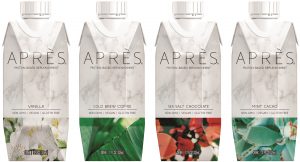Up-Market Snacks Attract Consumers
by
Growing numbers of consumers not only want clean-label snacks, they want snacks made with higher quality ingredients than ever before. They still crave crisp chips and crunchy crackers, but they increasingly seek products made with top-shelf ingredients — up-market snacks.
 “We’ve made the leap because we can,” says Nancy Kalish, the Founder and CEO of Rule Breaker Snacks, based in Brooklyn, New York. In addition to making snacks, she counts herself among those consumers looking for up-market snacks. “We’ve become more sophisticated, with the internet and its wealth of health information. Our consciousness about what we put into our bodies has been raised.”
“We’ve made the leap because we can,” says Nancy Kalish, the Founder and CEO of Rule Breaker Snacks, based in Brooklyn, New York. In addition to making snacks, she counts herself among those consumers looking for up-market snacks. “We’ve become more sophisticated, with the internet and its wealth of health information. Our consciousness about what we put into our bodies has been raised.”
She points out that consumer demand for such snacks has driven makers to produce them, and that they’re easy to find these days.
“We’re finding many more options that are in synch with that raised consciousness. There are really a lot of better-for-you options that are not hard to find, and that look and taste just as delicious as the not-so-good-for-you options. So it’s an easy switch.”
Kalish’s Rule Breaker Snacks makes 1.9-ounce individually wrapped Brownies and Blondies that are shelf-stable with a one-year shelf life and a suggested retail price of $1.99. The treats are made with chickpea flour, which allows them to be labeled gluten free, preservative free and non-GMO. Pouches of Brownie and Blondie Bites will be introduced later this year, she said.
Taking a Long View
Philip Kosak has been in the snack business for nearly 40 years. As the Founder of Carolina Fine Snacks, based in Greensboro, North Carolina, he remembers the very beginnings of the better-for-you snack market.
“Back in the ‘80s, the early players in the better-for-you segment were veggie chips and veggie straws,” he says. “Now that’s a billion dollar segment in the snack market.”
The reason is that “consumers have become much more sophisticated, both in their interests and in their tastes, Kosak says. “Millennials have driven a lot of that, starting and creating an intriguing environment for exploratory purchasing. Today, many interesting things are available on the market, but they’re not necessarily what the market wants.” He cites oft-repeated studies that show that what consumers say they want and what they actually eat are often two different things.
Kosak’s company makes Wicked Crisps, using new technology that allows the company to produce a vegetable crisp quite different from those manufactured in the early 1980s. “We learned how to incorporate vegetables into a product that includes all the organoleptics consumers want in snacks,” he says. “We can take spray-dried vegetables, reconstitute them into a dough, and then bake them. We can use ingredients that much more closely resemble consumers’ interests.”
Wicked Crisps offer 4 grams of plant-based protein per serving. Their color and flavor come from the vegetables, and because they’re baked, Kosak says, “We’re eliminating the fat that’s part of the guilt of potato chips. We can incorporate any vegetable and any fruit with this process.”
Women-Targeted Up-Market Snacks on the Rise
Darby Jackson, who lives in Los Angeles, California, says her own needs prompted her to found Après, a company that makes post-workout drinks for women. “This isn’t Muscle Milk,” she says, noting that women seek different products for their post-workout replenishment than their male counterparts do. “I spent a year and a half in research and development, working on the edges of science on this one,” she says. “It’s made with organic plant protein, organic coconut oil and organic coconut water.”
Individual 11-ounce recyclable Tetrapak bottles of Après have a suggested retail price of $4.95. Each has 160 to 180 calories, 13 to 14 grams of plant-based protein from peas and chia, and 6 grams of coconut sugar. The product comes in four flavors: Mint Cacao, Sea Salt Chocolate, Vanilla, and Cold-brew Coffee, which has 95 mg caffeine, from organic cold brew coffee.
When the product launched in November, 2017, it was marketed through direct-to-consumer sales and through fitness studios, she says. “We are starting to scale into retail now, and the product is doing very well.”
She credits more sophisticated consumers for her successes. “Consumers are really educating themselves and, in turn, are demanding more. You’re seeing a ton of innovation from small companies like us because the big guys can’t innovate like we can. But they’re buying up smaller companies, because they know what resonates with consumers.”
The modern wellness consumer skews heavily female, is very active, and is looking for up-market snacks that are good for her body, Jackson says. “We get a lot of customer emails – I read every one — and comments on our Instagram posts. They say things like, ‘We can really tell how much detail there’s been in how this product has been built.’ That means a lot to me.”
Using Creative Ingredients in Fresh Ways
At Cherryvale Farms, also based in Los Angeles, California, the company’s new line of Love It! Bars uses raisin paste as one of its sweeteners.
“It makes our product unique and wholesome, and as a mom, I can feel good about giving that to my kids,” says Lindsey Rosenberg, Cherryvale Farms’ Chief Executive Officer. “Retailers want novel ingredients, far beyond just high-quality oats. Raisin paste is our way, and real fruit is another way.”
Cherryvale Farms started in 2011 as a baking mix company. “But we’ve now morphed into a multi-category grocery brand,” Rosenberg says. “Younger moms were our demographic; they were looking for cleaner ingredients and simple ways to bake at home.”
As she came to know her customers, Rosenberg says, she realized that, “That same customer was on the hunt for a healthier bar. Everything we do is vegan and plant-based. Love It! Bars are essentially muffin bars, and they’re totally delicious, made with whole grains.”
Much larger companies are taking note of smaller companies’ up-market snack innovations, she says. “There are fewer reasons now to use artificial flavors and colors. We don’t have to engineer foods like previous generations. We have to look at what works, and what tastes great. Luckily, we’re seeing some of the major brands doing it, too. Not just us little guys.”
“Lots of companies are coming out with stuff for niche diets,” says Rosenberg. “We don’t put the word ‘vegan’ on our marketing, because we think ‘plant-based’ is something that makes the products much more approachable. We can make a bar without dairy or eggs that tastes just as delicious as ones that have both,” she says. “We never want to be a delicious vegan bar. We just want to be a delicious bar.”




